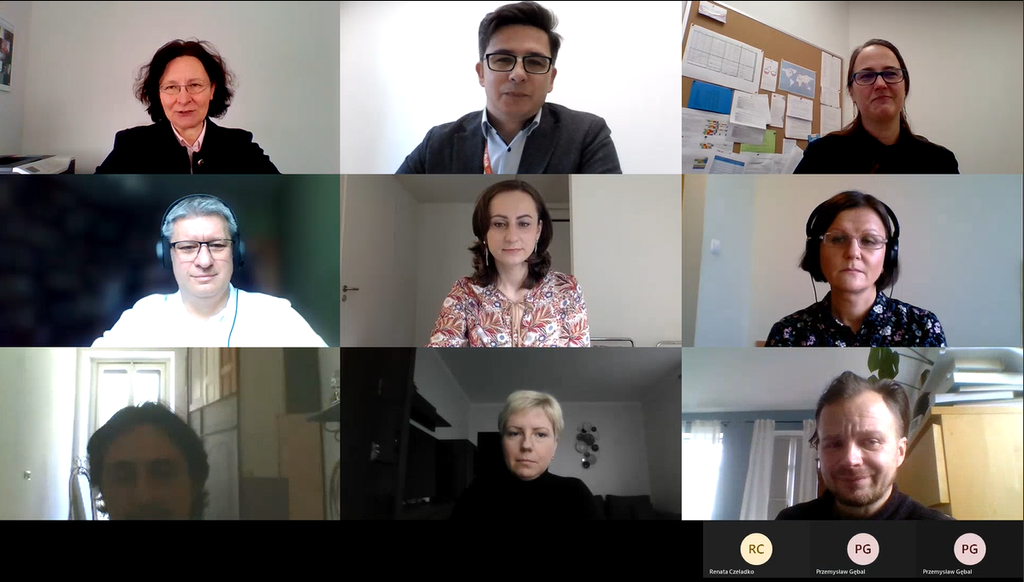Interest in Polish philology, culture, and history brought together researchers from Ukraine, Italy, Belarus, Turkey, and the US.
‘We are happy that scholars who are interested in the Polish language and who study it became beneficiaries of the Polonista NAWA programme. You are the first researchers-fellows of the programme. I am certain that you will speak and write about Polish with an even greater enthusiasm after completing your fellowships. What is more, I hope that you will remain Poland’s friends,’ Dr. Grażyna Żebrowska, Director General of the Polish National Agency for Academic Exchange, welcomed foreign researchers – beneficiaries of the Polonista NAWA programme at their first meeting.
The meeting was organised by NAWA and held online. It was attended by fellows of the Polonista NAWA programme who had already commenced their projects. Last year was the first time when scholarships under the programme were granted not only to students who wish to take up Polish studies in Poland, but also to researchers interested in the Polish language, literature, culture, history, and art. NAWA fellowships were offered to eight scholars in total, including three from Ukraine, two from Italy, and one from Belarus, Turkey, and the US each.
Five of them are currently involved in their research projects in Poland:
- Prof. Alessandro Ajres from the University of Turin (Italy) at the University of Silesia in Katowice – project titled ‘Hip-hop Music and Urban Art. Silesia as a Center of New Cultural and Communication Patterns’;
- Prof. Viktoriia Durkalevych from Drohobych Ivan Franko State Pedagogical University (Ukraine) at the Nicolaus Copernicus University in Toruń – project titled ‘The Semiotics of the City. Comparative Studies of the Literary Identities of Toruń and Drohobych’;
- Dr. Olena Humeniuk from Borys Grinchenko Kyiv University (Ukraine) at the Nicolaus Copernicus University in Toruń – project titled ‘Poland – a Centre of Ukrainian Student Corporations in the Years 1920–1939’;
- Dr. Oksana Hysa from Ternopil Volodymyr Hnatiuk National Pedagogical University (Ukraine) at Adam Mickiewicz University in Poznań – project titled ‘Lviv and Poznań School of Musicology: History, Typology, Development Tendencies’;
- Dr. Jacopo Saturno from the University of Bergamo (Italy) at the Silesian University of Technology – project titled ‘Intercomprehensive Teaching of Polish as a Foreign Language to East Slavs in a Comparative Linguistic Perspective.’
Prof. Dariusz Pniewski, one of the experts who evaluated the applications for the Polonista NAWA programme, emphasised that the range of interests of the scholars who won fellowships under the programme was very wide: ‘They are not only specialists in Polish studies; they study culture and history, and that in a variety of ways. All these scholars have proposed unobvious topics and unobvious angles from which to approach them.’
In addition, NAWA beneficiaries are involved in various other activities related to the promotion of the Polish language and culture, e.g. they teach classes or promote NAWA’s offer for foreigners interested in learning Polish or studying in Poland at their home universities.
Furthermore, Prof. Pniewski pointed out that a growing interest in Polish can be noted abroad. This is not only interest stimulated by practical reasons, such as e.g. the need to learn Polish in order to find a job in Poland. The tendency is shifting towards interest in Polish as a subject of research.
‘Judging from how it functions abroad, Polish language paedagogy is becoming increasingly academic. Foreign institutions employ persons whose interests are centred on learning and teaching Polish. They often work at institutions where other languages are studied or where foreign languages in general, including Polish, are taught,’ confirms Prof. Przemysław Gębal, advisor of NAWA fellow Dr. Jacopo Saturno. ‘And this is the first step towards showing that Polish language paedagogy is not just some local idea with which we are trying to enchant the world, that people really believe in this idea and our language, and that its teaching is gradually becoming equivalent to teaching other languages.’
Prof. Gębal adds that the projects of NAWA beneficiaries, such as that carried out by Dr. Saturno, could contribute to professional Polish language teaching and professional training of teachers of Polish as a foreign language.











